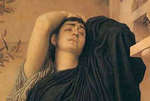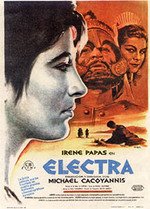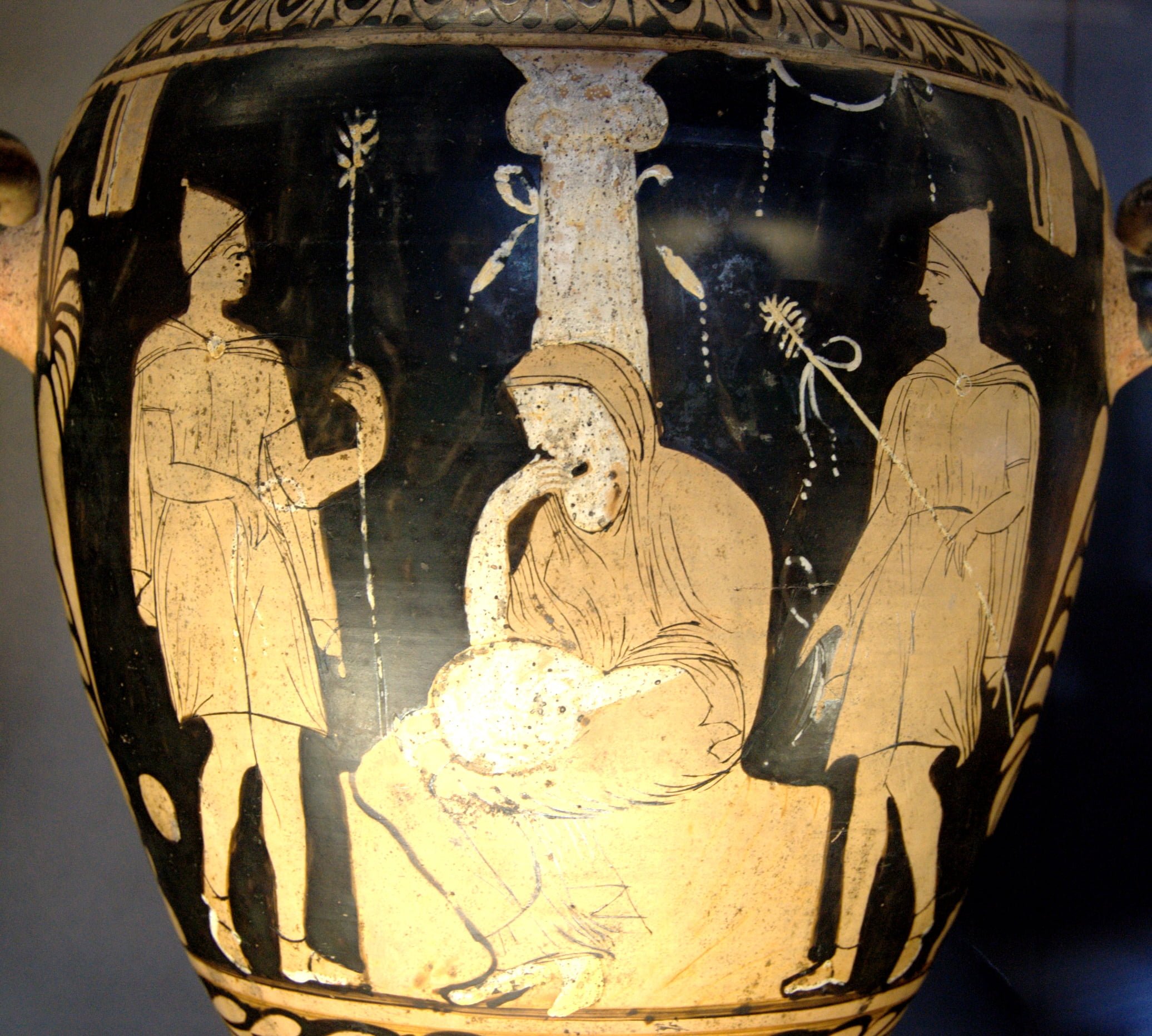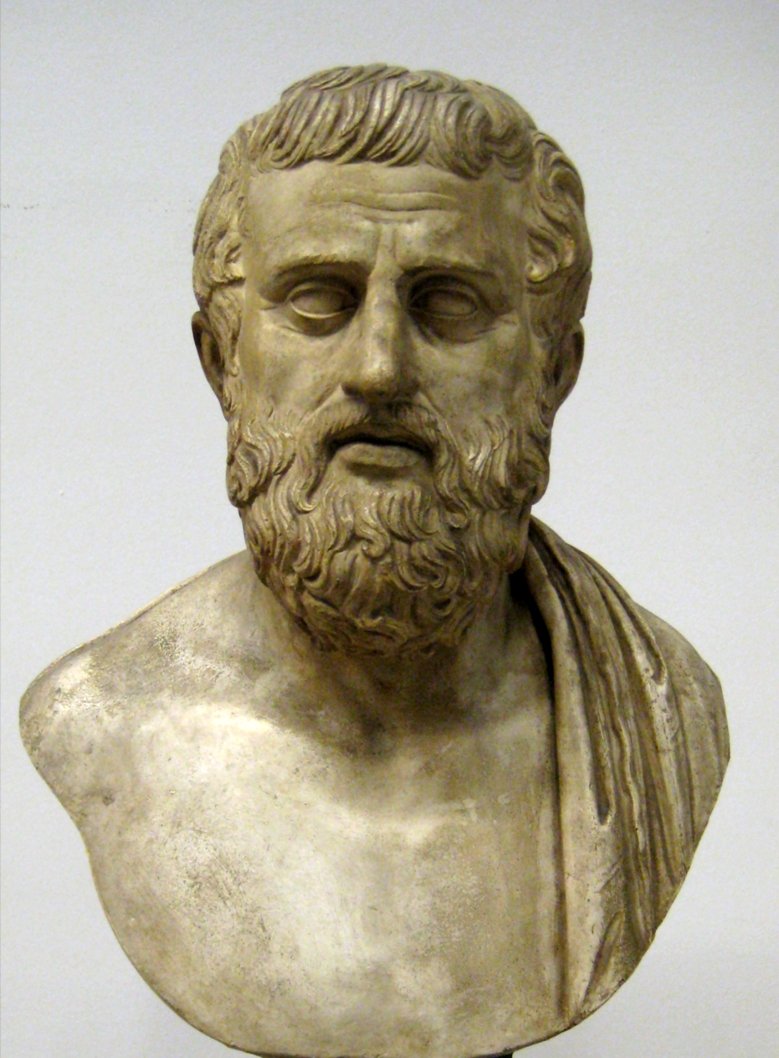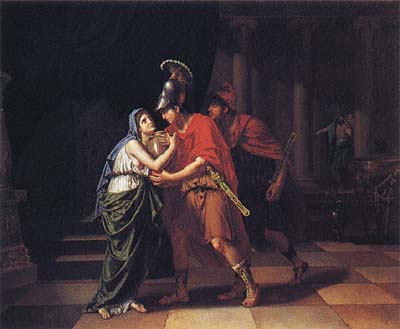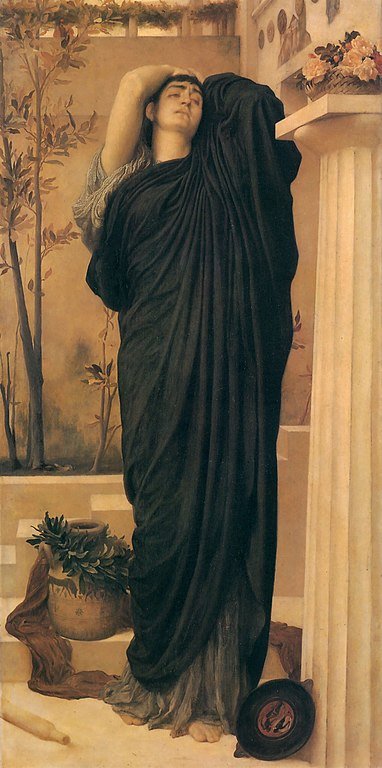
Electra
Electra by Euripides
First produced in the mid-410s, Euripides’ Electra is an intertextual (and, thus, rather anti-tragical) parody of previous versions and dramatizations of the same myth. Set in a peaceful, rustic environment, the play is introduced by a rare guest in Ancient tragedy, an ordinary farmer, who, quite extraordinarily, describes himself as the unwilling husband of none other than Electra. Apparently, after the murder of Agamemnon by Clytemnestra and Aegisthus, the new king decided to give Electra away to him, and now the two live together in a cottage on the outskirts of Argolis as a husband and wife, even though the they have never consummated their “marriage.” After being told so by Apollo, Orestes arrives there, accompanied by his close friend, Pylades, and pretending to be a messenger of Electra’s brother (that is, himself). He is welcomed by the Farmer and Electra, who, in an attempt to be a more welcoming host despite her spare resources, sends her husband to summon an old slave of Agamemnon who, in turn, should bring food for the guests. Interestingly, however, this slave is the very one who had saved Orestes from Aegisthus’ ploys to get rid of him, so he has no problem recognizing the young boy after arriving—even though in a way which parodies the implausibility of the similar recognition scene in Aeschylus’ Libation Bearers. Now that everyone knows the guests’ true identity, Orestes, Pylades, Electra, and the Old Man start plotting the murders of Aegisthus and Clytemnestra. The men leave to get rid of Aegisthus, and not long after a messenger comes back from the royal palace to inform Electra that Orestes and Pylades have killed Aegisthus after joining his feast while he was offering a sacrifice on his nearby estates. Orestes returns with the body of Aegisthus at the farmer’s hut and waits there with Electra for the arrival of his mother. Even though Orestes is not that charmed by the idea of committing a matricide despite this being Apollo’s strict order, Electra is pretty resolute. Clytemnestra comes and, after a brief confrontation between her and her daughter, the siblings kill their mother inside the hut. Their instant remorse is somewhat mollified by the sudden appearance of the Dioscuri—sons of Zeus and brothers of Clytemnestra—whose declaration that Apollo’s oracle was not a wise one is, fortunately, followed by some words of comfort and prophecies about the participants’ future fate, which for Electra amounts to a marriage with Pylades, and for Orestes—permanent exile.
Date and Historical Background
Most scholars nowadays would argue that 420 or 419 BC is the most probable date for Electra’s first production, even though earlier critics, based on perceived references to contemporary events and other plays of the period, had all but fixed its date to 413 BC.
Based on metrical evidence, the play belongs undoubtedly to this eight-year period, but since Sophocles’ Electra can be placed between 420 and 410 BC as well, the thought-provoking mystery of whether Sophocles’ Electra is a comment on Euripides’ version (who, afterward, came back with one more intertextual answer: Orestes) or it is the other way around, will probably remain unresolved for the foreseeable future, if ever.
Characters and Setting
Characters
• Farmer, Electra’s husband
• Electra, sister of Orestes, daughter of Agamemnon and Clytemnestra,
• Orestes, brother of Electra, son of Agamemnon and Clytemnestra
• Pylades, a friend of Orestes (non-speaking role)
• An Old Man, a former slave of Agamemnon
• Messenger, a slave of Orestes
• Clytemnestra, widow and murderer of Agamemnon, wife of Aegisthus
• Dioscuri: Castor and Polydeuces (non-speaking role)
• Chorus of young Argive women
Setting
A farm cottage in the Argive countryside.
Summary of Electra
Prologue
Structurally divided into four parts, the prologue to Electra begins with a monologue by a poor Farmer before his modest hut—something that hardly suits the high art of ancient tragedy. Per usual, the monologue gives us the necessary backstory that briefly covers everything from Agamemnon’s successes under Troy through his murder by Clytemnestra and her lover, Aegisthus, to Orestes being smuggled away from his father’s house by Agamemnon’s old slave for justified fears that he is Aegisthus’ next target. The Farmer, however, reveals to us one or two things about Orestes’ sister, Electra, that can’t be found in other myths. Namely, for fear that Electra would give birth to a noble son who would then avenge Agamemnon, Aegisthus fended off her suitors and even planned to kill her, but Clytemnestra intervened and saved her daughter’s life. Still afraid of his wife’s children and possible grandchildren, Aegisthus was forced to devise a different scheme: he promised gold to anyone who should kill Orestes and gave Electra’s hand in marriage to a poor peasant—the very Farmer who tells us this story. Humble and self-effacing, the Farmer adds that he is aware that he doesn’t deserve Electra and that he is practically ashamed to be her husband. Because of this, he has never consummated the relationship, and can hardly wait for Orestes to return to Argos and save his sister from her “unfortunate marriage.”
It is at this moment that Electra comes out of the hut, dressed in rags and carrying a water pitcher on her head. In this second part of the prologue, the spouses discuss their household chores and eventually leave off to perform them. A moment later, accompanied by his friend Pylades, Orestes enters and, in the third part of the prologue, states his intention to find the whereabouts of his sister, enlist her help, and, in due course, avenge the death of his father. After they notice Electra returning with the water pitcher from a nearby spring—and thinking her a maidservant—Orestes and Pylades step back a little, determined to receive from her some word about their matter of interest. The fourth part of the prologue is actually a lyrical ode sung by Electra as she comes back from the spring, lamenting the destinies of her father, her brother and herself.
Parodos (Entrance Song)
“O Electra, daughter of Agamemnon, we have come to your rustic courtyard,” say a few Argive girls (the Chorus) as they near the Farmer’s hut. They are there to invite Electra to a festival to Argive Hera, but Electra is unwilling to go: “My unhappy heart beats fast, friends,” she says to them, “but not at adornment or gold; nor will I set up choruses with the maidens of Argos and beat my foot in the mazes of the dance.”
First Episode
While talking to the Argive maidens, Electra suddenly catches sight of Orestes and Pylades, coming out of their shelter. Initially afraid, Electra begs the strangers to spare her life, but they alleviate her fears immediately: “I have come to bring you word from your brother,” says Orestes, still incognito; after telling her that his brother is alive, he starts asking her questions about her own fate. He is surprised to learn that she is married to a poor man, even though Electra insists that though poor, he is also noble, virtuous and respectful to her, and has never dared to touch her in an inappropriate way. Happy to hear that, Orestes proceeds to question Electra over the whereabouts of her mother, about whom Electra has not one kind word to say. “If Orestes comes to Argos,” Orestes ominously asks, “would you dare, with him, to kill your mother?” “Yes,” replies Electra without hesitation, “with that same ax by which my father died… Once I had shed my mother's blood, I might die!” After revealing to her brother a few things more about the happenings at the royal court and bemoaning her fate to die an unmarried virgin despite being courted by Castor, Electra begs the “stranger” to report everything to Orestes and tell him to return and avenge Agamemnon as soon as possible.
At this point, the Farmer returns from the fields and, after being told by Electra all about the mission and the identity of the strangers she is talking to, immediately invites them in. “Go into the house,” he says, “for, in return for your good tidings, you shall find as much hospitality as my house holds in store.” Electra, however, thinks that the hospitality her husband’s house can offer is not enough for such prominent guests: “O reckless man, why, knowing the poverty of your house, did you welcome these strangers, greater than you?” So, she sends the Farmer to summon the only man she knows who can recognize Orestes and who will be happy to hear that he is alive: Agamemnon’s old slave, the one who had saved her brother as a boy from Aegisthus’ murderous hands by sending him to Phocis. “Bid him come,” Electra says, “and provide something for the guests' meal.”
The Farmer leaves, and, in the first stasimon, the Argive women start singing of the exploits of Achilles during the Trojan War. “Your adultery killed the leader of such mighty warriors, evil-minded daughter of Tyndareus!” they add some relevance to their song in the final stanza, lamenting the death of Agamemnon as well while expressing hope that a proper punishment for Clytemnestra’s infidelity would inevitably come.
Second Episode
Bringing a newborn nursling of his flock and some wine as provender for the guests, Agamemnon’s old slave arrives at the Farmer’s cottage. Electra notices tears in the Old Man’s eyes and asks him what might be the reason for them. Out of breath, he explains to her that he has come from Agamemnon’s tomb where he has just performed some burial rites only to be startled by a strange and hope-inducing sight. Namely, he observed fresh blood poured on the tomb and a few severed locks of yellow hair. “Perhaps,” he says, “perhaps your brother has somehow come secretly and on his return has done honor to his father's wretched grave. Go look to see if the color of the cut lock is the same as yours, putting it to your own hair; it is usual for those who have the same paternal blood to have a close resemblance in many features… Then stand in the footprint and see if the tread of the boot will measure with your own foot, child.” (To those unfamiliar with the plot of Libation Bearers, this is precisely how Electra recognizes Orestes in Aeschylus’ revered play). Electra laughs off the Old Man’s suggestions (and, thus, Euripides laughs off the structure Aeschylus’ tragedy): “Your words are unworthy of a wise man,” she says to him, arguing that neither the footprints nor the hair locks of siblings need resemble each other, especially not if they belong to members of two different sexes.
As the Old Man and Electra discuss, Orestes and Pylades come out of the hut. Intrigued for some reason, the Old Man starts circling around Orestes and examining him as if he is “the clear mark impressed on a silver coin.” And then he exclaims looking in Electra’s direction: “Look now at this man, my child, your dearest one: this is Orestes, Agamemnon’s son.” Electra is quickly persuaded, for the Old Man has a clear proof: a scar along Orestes’ brow received from a childhood accident, which happened while the siblings had been chasing a fawn together. A brief reunion scene follows, after which the siblings start plotting the murder of Aegisthus and Clytemnestra. They plan to murder the former while he is at a sacrifice on his nearby estates (at the suggestion of the Old Man) and to kill their mother after tricking her out of the royal palace with the false announcement of the birth of a son to Electra. With not much time at their disposal, Orestes and Pylades immediately leave to get rid of Aegisthus. They are led by the Old Man who is instructed to afterward visit Clytemnestra and tell her that, just ten days before, Electra gave birth to a son.
In the second stasimon, the Chorus sings of Aerope’s adultery with Thyestes, her husband’s brother, and of Atreus’ subsequent revenge (killing Thyestes’ children and serving them as dinner to his brother), an act so horrible that even the sun changed its course to hide the sight from daylight. Aegisthus, Clytemnestra’s husband, was the only one of Thyestes’ children that survived and he avenged his siblings by killing Atreus’ first-born son, Agamemnon. It is a never-ending cycle of blood and death, the Argive women fear, the next act of which they are about to witness just now.
Third Episode
One of the young girls hears a cry coming from the palace. Not long after, a Messenger—one of Orestes’ servants—arrives in haste before the Farmer’s hut and announces the death of Aegisthus: Orestes murdered him after being welcomed by the king and helping him sacrifice an ox with that very same ritual knife. Aegisthus’ servants attempted to avenge their master’s death, but after Orestes revealed his identity, they laid down their weapons and started kissing their rightful ruler. As Electra and the Argive maidens rejoice at the news, Orestes and Pylades return, their servants carrying the body of Aegisthus. In a long monologue, Electra expresses her scorn for her stepfather, among other things berating him for both being a ladies’ men (“As to your women… you were insolent because you had a king's house and were endowed with good looks”) and a lady’s man (“Among all the Argives you would hear this: ‘That woman's husband,’ not ‘that man's wife’”).
As Pylades and his servants take Aegisthus’ body into the hut, Orestes and Electra start discussing their next murder, that of their mother. Orestes is hesitant and even questions whether Apollo’s oracle was right, but Electra is more than resolved and bullies her brother into compliance, sending him inside the cottage the minute she sees Clytemnestra’s chariot in the distance. Now, all that remains is for her to lure Clytemnestra inside, which she eventually does, after a long discussion with her mother during which the two women argue the justifications for their behaviors. Unlike in Aeschylus, Clytemnestra is quite remorseful in Euripides, not only forgiving Electra for not loving her but even deeming herself too cruel toward Agamemnon. “You sigh too late, when you have no remedy,” says ominously Electra, before tricking Clytemnestra inside her husband’s hut on the premise that she gave birth to her son alone and she has no one to offer the tenth-day sacrifice to the gods for him (as was customary in Ancient Greece).
Left alone before the cottage, in the third stasimon, the Argive maidens reminisce about Agamemnon’s death, and before too long, their song distressingly starts reverberating Clytemnestra’s death cries coming from the cottage: “O children, by the gods, do not kill your mother…”
Exodos (Exit Song)
After a brief silence, the front door of the hut is opened, and the dead bodies of Aegisthus and Clytemnestra can be seen inside. Orestes and Electra step outside in the courtyard, distressed and grief-stricken. “Too many tears, my brother, and I am the cause,” cries Electra. “Unhappy, that I came to fiery rage against this woman, who was my mother!” “Ah, Phoebus!” replies Orestes, “you proclaimed in song unclear justice, but you have brought about clear woes and granted me a bloody destiny far from the land of Hellas. To what other city can I go? What host, what pious man will look at me, who killed my mother?”
The siblings’ lament is unexpectedly interrupted by the Dioscuri, Castor and Polydeuces, once twin-brothers of Clytemnestra, now demigods transformed into the constellation Gemini. Echoing Orestes’ concerns, Castor says to him that although Phoebus is wise, this time he gave him oracles that were not. At the present moment, however, all he can do is accept his unjust deed and try to find some salvation by fleeing to Athens. There, Castor prophesizes, Apollo will take the blame upon himself during his murder trial, and an equal number of votes for and against him will eventually save Orestes from death. As the two siblings say heartbreaking farewells to each other just a few hours after reuniting, Orestes advises Pylades to marry his sister, a union blessed by the Dioscuri themselves.
A Brief Analysis
Even though it is not known whether Euripides’ Electra follows or precedes Sophocles’ play of the same title—this simple fact affects the interpretation of both plays in numerous significant ways—it undoubtedly comes after Aeschylus’ majestic trilogy Oresteia, since it demonstrably parodies its middle play, Libation Bearers, most pointedly during the recognition scene, but more significantly through several subtle plot and setting adjustments which eventually add up to a complete and utter revision of Aeschylus’ celebrated work.
To begin with, the play’s setting is not a royal palace, but a farmer’s hut—a setting “more suggestive of folktale than tragedy” (as one critic, Cecelia A.E. Luschnig, has noted). This simple change, however, brings about so many modifications in the structure of the myth and the characterization of its main protagonists that it allows a little space for Aeschylus’ heroic interpretation of Orestes’ act of revenge. It is not only the glamor of Orestes’ revenge that is lost by way of this “setting modification”—it is also its justification that eventually becomes highly questionable and problematic.
Namely, the change of setting means, first of all, that Orestes’ and Electra’s plan of action must be modified as well: Euripides has them thinking not how to get inside the palace, but how to lure Clytemnestra and Aegisthus out of it. This, however, makes the new royal couple much more defenseless and, thus, much less deserving of their downfall. Euripides clearly and palpably—though subtly and sensitively as well—highlights this alteration by having Orestes and Pylades murder the welcoming and unsuspecting Aegisthus during a sacrificial feast, an act which transforms Aeschylus’ cowardly tyrant into a much more relatable victim. The author does the same in the case of Clytemnestra, who is portrayed as a concerned mother repentant of her past transgressions in the discussion immediately preceding her death.
Of course, this inevitably modifies the portrayals of Orestes and Electra as well, who are not anymore indisputable righters of wrong, but “flawed and neurotically unstable” antiheroes (Storey and Allan). On the background of the transformed Aegisthus and Clytemnestra, Aeschylus’ determined and valiant Orestes becomes an arrogant youth uncertain in both his mission and his own identity, and Aeschylus’ mistreated and relatively peaceful Electra turns not only into a self-pitying sufferer of self-imposed martyrdom but also into the prime mover of the matricide (in Aeschylus, the few words of the here-silent Pylades expunge Orestes’ reluctance and act as the final instigator of the murder).
Almost typically for the more mature Euripides, the final murder in a tragedy questions not only the motives of the murderers but the role of the gods in the human world as well. In Electra this is even more explicit than in other plays, since a demigod, Castor, one of the Dioscuri, unambiguously says to Orestes that for all the wisdom that his master Apollo has, he has given the avenger oracles that were not wise at all. That adds to the irony of Orestes’ former doubts whether Apollo’s oracle was right, to begin with: contrary to expectations, in the end, it turns out that it never was.
Electra Sources
There are many translations of Electra available online, both in verse and in prose; if you are a fan of the latter, you can read E. P. Coleridge’s translation for Loeb Classical Library here. If, however, you prefer poetry, feel free to delve into Arthur S. Way blank verse adaptation here.
See Also: Euripides, Libation Bearers, Sophocles, Electra
Electra Video
Link/Cite Electra Page
Written by: The Editors of GreekMythology.com. GreekMythology.com editors write, review and revise subject areas in which they have extensive knowledge based on their working experience or advanced studies.
For MLA style citation use: GreekMythology.com, The Editors of Website. "Electra". GreekMythology.com Website, 04 Nov. 2019, https://www.greekmythology.com/Plays/Euripides/Electra/electra.html. Accessed 23 April 2024.

